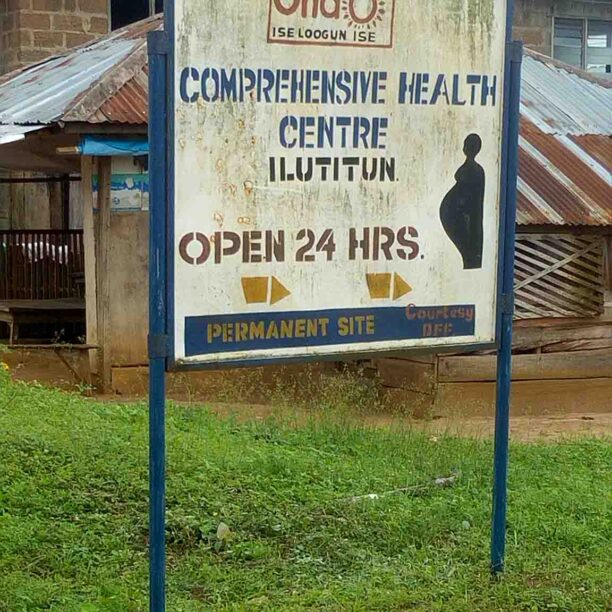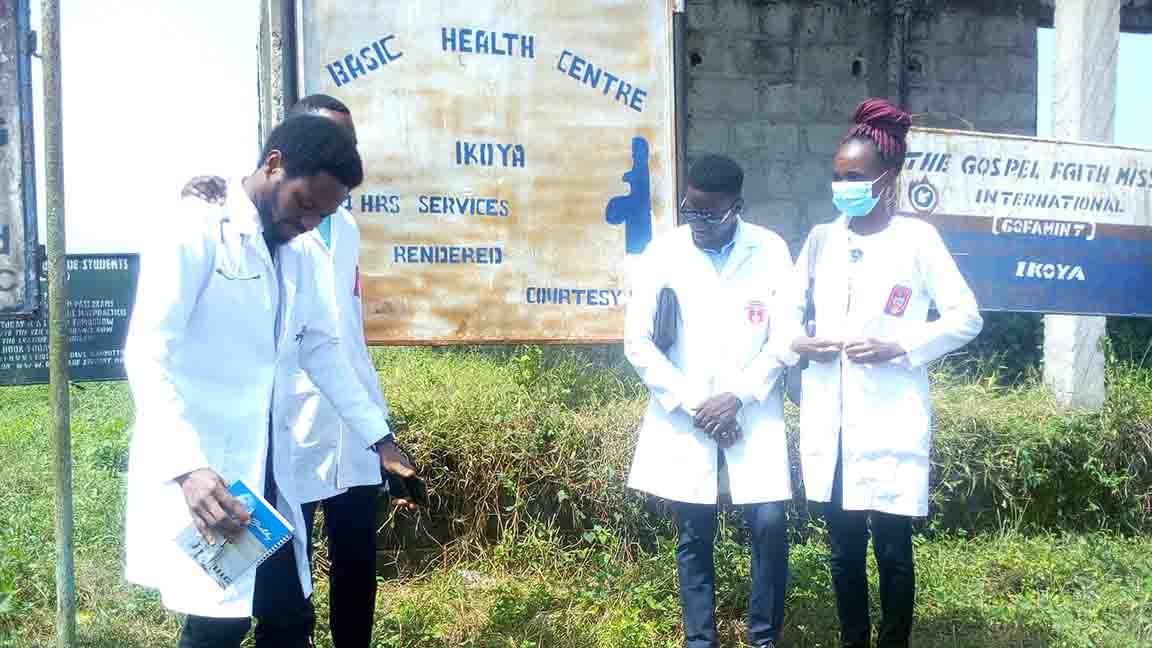THE FIRST YEARS of medical school in Nigeria are spent mostly in the classroom, in science labs that prepare you with the knowledge you will need for handling patients when clinical rotations begin. I attended medical school in Ondo town, a rural town in southwestern Nigeria. Having grown up in busy, fast-paced, English-speaking Lagos, I had been looking forward to better speaking my native Yoruba and getting to know the roots I had in Ondo state, where my father grew up. But in the course of my time in Ondo, I experienced a real culture shock, as unfamiliar cues that were instinctive to my colleagues were lost on me.
I spent those early years bored by the repetitive din of classrooms, lectures, and examinations that did not stir my imagination, but I was also looking forward to walking through the halls of an actual hospital, and seeing real patients instead of dissecting cadavers, measuring reagents in a lab, and memorizing biochemical pathways.
The first time a consultant thrust me in front of a patient, he asked me to take clinical information and work up a diagnosis.
I asked the questions I had been taught, wide-eyed and confident, fully expecting the patient to rattle off the answers. She looked at me, a little bewildered, for a moment—as though she could see through my charade of pretending to be a doctor—and then turned to my colleague, who was also a student, and directed her answers at him. I kept trying to get her attention back, but she seemed uninterested, and after a while, a little irritated by my persistence.
I walked home that day confused and a bit saddened. I kept rolling the experience over in my mind, wondering why that patient, and even some others that same day, had ignored me and my questions. I’d said all I had been taught to say correctly. But after a while, I began to notice a disturbing pattern.
Before entering medical school in Ondo, I had lived insulated by middle-class Lagos’ relative disregard for personal qualities like age, gender, and body size as markers signifying respect. In Lagos, these things still matter, because Lagos exists within Nigeria, and in the Yoruba culture of submission to elders. But status in Lagos is determined more by class than it is in Ondo. Being able to speak a certain way, having a certain educational background, the luxury of not having to have a spiky personality (because you were protected from needing one in the first place)—where I grew up, these markers of status were more significant than being older and the like.
In Ondo, I learned, things were a lot more traditional. Someone who appeared as I did then, a teenage female, soft-spoken and small-framed, could not expect to be taken seriously as a doctor in training. I did not look the part. And because my Yoruba was very shaky, I also did not speak the part. Yoruba-speaking patients in Ondo, I found, are often slow to trust someone who can’t speak the language fluently. Quick to get frustrated and disregard such a person.
I have a complicated relationship with the deference shown by rural, uneducated patients to doctors—it opens the door to abuses of power. But I also, frankly, did not want to be completely disregarded!
Picture several medical students lined up behind one or two doctors, for ward rounds. They gather beside a patient on a long ward, and the more senior of the doctors explains a few concepts and begins to ask the students questions. Picking apart their answers when they aren’t correct, poking fun at them here and there. That is what ward rounds look like, inevitably.
The culture of the university I attend has the reputation of being milder and more forgiving than most medical schools. So it is bewildering, even appalling, to hear older physicians speak of their experiences when they were in our shoes as medical students. There are stories of senior doctors haranguing students till they burst into tears, threats to fail students they don’t like (not unusual in the Nigerian tertiary education system), and a general disregard for the mental wellbeing of trainees.
These abuses seem inevitable, given how the medical system in Nigeria is structured. No one is really at the top; not doctors, not patients, definitely not students or other health care staff, so that picking one another apart is a means of coping with the daily reality of a healthcare system that is structured to incapacitate you, no matter what you try to do for your patients.
Why are medical doctors leaving Nigeria in record numbers? And why are Nigerian patients seeking healthcare abroad? I wrote about these issues at the start of the pandemic. The fact is that not everyone can afford to leave Nigeria to be treated. For the rural poor of Nigeria, the situation is grim.
A year or so after I started my clinical rotations, I began my pediatrics and obstetrics postings with my old grievances.
But I saw the realities of some of the most vulnerable people in society—many of them women and very young children—and how the society fails them. The government’s inadequate funding of the health system makes an already bad situation much worse when people end up in the hospital.
I saw a baby in the neonatal ward who needed oxygen to survive. His mother—very young, unemployed, and living in a farming settlement—did not have the funds to provide the needed oxygen. Neither did the grandmother or other family members. And neither, frankly, did the hospital; because funding had been cut short by the government, the hospital was no longer able to provide the oxygen in the customary way, in advance of payment. The Ondo state government was months behind on paying salaries for their workers. How could they pay for the weakened health service?
I watched that baby struggle to breathe, his chest heaving, and felt a deep anger at the injustice of it all. And helplessness.

Witnessing situations like these explains why more and more health workers leave the country to seek better working conditions. It is a solution, in the immediate sense, for health workers. But the underlying problems remain, from poor government expenditure on health care to an ineffective national health insurance system. These will affect the Nigerian patients left behind, especially in rural areas that are already underserved.
The doctors who stay behind have to contend with how these issues will affect their practice.
While I am slow to completely gloss over the hurt and confusion of those early days in clinical rotation, I now ask myself new questions: how did it feel to be a patient in that situation? In need of help for a medical condition you probably did not understand, that would stretch your already limited funds.
Perhaps that patient looking to my colleague that first day was in search of a friendly face, a familiar language in a sea of confusion. Perhaps she needed more than just rote knowledge to get better, to feel safe. Patients are more than their conditions, they are people too. It is easy to forget that in the noise and stress of the medical field.
I have gotten better at speaking Yoruba. I am not there yet, but I am miles from where I was when I first got to Ondo. And, I am also miles away from my simple ideas of what identity and “roots” are. I don’t think it matters so much—you grew up here, or there. You are who you are. When I visit Lagos now, the chaos feels welcoming, and I no longer feel that it robbed me of some indeterminate form of authenticity.
In addition to my language skills, Ondo formed a new part of my identity—it shook me up. Forced me to examine my biases, shattered the cocoon of ignorance I had about the realities of poor people’s lives, people with a different background than mine, people who thought differently; I learnt how to be more human. More humble, forced to be compassionate, because medicine is not a field for the simple-minded, or the cold-hearted.
Thank you for visiting POPULA! Add your email here to receive our newsletter!






